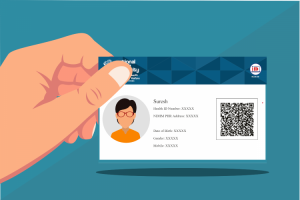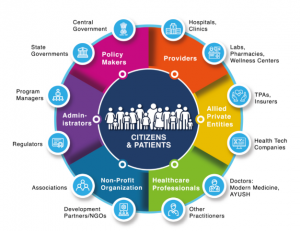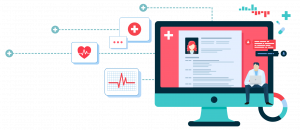India’s National Health ID – Losing Privacy with Consent
By Anonymous | October 29, 2021

“Every Indian will be given a Health ID,” Prime Minister Narendra Modi promised on India’s Independence Day this year, adding, “This Health ID will work like a health account for every Indian. Your every test, every disease – which doctor, which medicine you took, what diagnosis was there, when they were taken, what was their report – all this information will be included in your Health ID.”[1] The 14 digit Health ID will be linked to a health data consent manager – used to seek patient’s consent for connecting and sharing of health information across healthcare facilities (hospitals, laboratories, insurance companies, online pharmacies, telemedicine firms).

Technology Is The Answer, But What Was The Question?
India’s leadership of the landmark resolution on digital health by the World Health Organization (WHO) has been recognized globally. With a growing population widening the gap between number of health‑care professionals and patients (0.7 doctors per 1000 patients[3]) and with increasing cost of health care, investing in technology to enable health‑care delivery seems to be the approach to leapfrog public health in India. And, the National Digital Health Mission (NDHM) is India’s first big step in improving India’s health care system and a move towards universal health coverage.
PM Modi says “This mission will play a big role in overcoming problems faced by the poor and middle class in accessing treatment”[4]. It aims to digitize medical treatment facilities by connecting millions of hospitals. The Health ID will be free of cost and completely voluntary. Citizens will be able to manage their records in a private, secure, and confidential environment. The analysis of population health data will lead to better planning, budgeting and implementation for states and health programmes, helping save costs and improve treatment. But, with all its well intentions, this hasty rush to do something may actually be disconnected with ground reality and challenges abound.

Consent May Not Be The Right Way To Handle Data Privacy Issues
Let’s start with ‘voluntary’ consent. The government might be playing a digital sleight of hand here. Earlier this month, the Supreme Court of India issued notices to the Government seeking removal of the requirement for a National ID (Aadhar) from the government’s CoWin app. The CoWin app is used to schedule COVID vaccine appointments. For registration, Aadhar is voluntary (you can use a Driver’s License), but the app makes Aadhar required to generate a certificate[5]. You must be thinking what National ID has to do with National Digital Health ID? During its launch of National Digital Health ID, the government automatically created health ids for individuals that used the National ID for scheduling a vaccine appointment. 122 million (approx. 98%) of 124 million IDs generated have been for people registered on CoWin. Most recipients of the vaccine were not aware that their unique Health ID had been generated[6].
Then there is the issue of ‘forced’ consent. Each year, 63 million Indians are pushed into poverty due to healthcare costs[7] i.e. two citizens every second, and 50% of the population lives in poverty (3.1 USD per day). One of the stated benefits of Health ID is that it will be used to determine distribution of benefits under Government’s health welfare schemes. So if you are dependent on Government schemes or looking to participate, you have to create a Health ID and link it with the National ID. As Amulya Nidhi of the non-profit People’s Health Movement puts it “People’s vulnerability while seeking health services may be misused to get consent. Informed consent is a real issue when people are poor, illiterate or desperate[8].”

Good Digital Data Privacy Is Hard To Get Right
Finally, there is the matter of ‘privacy regulation’, the NDHM depends on a Personal Data Protection Bill (PDP) which overhauls the outdated Information Technology Act 2000. After two years of deliberation the PDP is yet to be passed, and 124 million Health IDs have already been generated. Moreover, principles such as qualified consent and specific user rights have no legal precedence in India[9]. In its haste, the Government has moved forward without a robust legal framework to protect health data. And without a data protection law or an independent data protection authority, there are few safeguards and no recourse when rights are violated.
The lack of PDP could lead to misuse of data by private firms and bad actors. It may happen that an insurance agency chooses to grant coverage only to customers willing to link their Health IDs and share digitised records. Similarly, they may offer incentives to those who share medical history and financial details for customised insurance premium plans[10]. Or, they may even reject insurance applications and push up premium rates for those with pre-existing medical conditions. If insurance firms, hospitals etc. demand health IDs, it will become mandatory, even if not required by law.
The New Normal: It’s All Smoke and Mirrors
In closing, medical data will lead to better planning, cost optimization, and implementation for health programs. But without a robust legal framework, the regulatory gap poses implementation challenges for a National Digital Health ID. Moreover, the government has to rein in intimidatory data collection practices else people will have no choice but to consent to access essential resources which they are entitled to. Lastly as the GDPR explains, consent is freely given, specific, informed and an unambiguous indication of the data subject’s wishes. The Government of India needs to decouple initiatives and remove any smoke and mirrors, so people are clearly informed about what they are agreeing to in each case. In the absence of such efforts, there will be one added ‘new normal’ for India – losing privacy with consent.
References:
1. Mehrotra Karishma (2020). PM Announces Health ID for Every Indian. The Indian Express. Accessed on October 25, 2001 from: https://indianexpress.com/article/india/narendra-modi-health-id-coronavirus-independence-day-address-6556559/
2. Bertalan Mesko et al (2017). Digital Health is a Cultural Transformation of Traditional Healthcare. Mhealth. Accessed on October 25, 2001 from: https://www.ncbi.nlm.nih.gov/pmc/articles/PMC5682364/
3. Anup Karan et al (2021). Size, composition and distribution of health workforce in India. Human Resources for Health. Accessed on October 25, 2001 from: https://human-resources-health.biomedcentral.com/articles/10.1186/s12960-021-00575-2
4. Kaunain Sheriff (2021). PM Modi launches Ayushman Bharat Digital Mission. The Indian Express. Accessed on October 25, 2001 from: https://indianexpress.com/article/india/narendra-modi-pradhan-mantri-ayushman-bharat-digital-health-mission-7536669/
5. Ashlin Mathew (2021). Modi government issuing national health ID stealthily without informed consent. National Herald. Accessed on October 25, 2001 from: https://www.nationalheraldindia.com/india/modi-government-issuing-national-health-id-stealthily-without-informed-consent
6. Regina Mihindukulasuriya (2021). By 2025, rural India will likely have more internet users than urban India. ThePrint. Accessed on October 25, 2001 from: https://theprint.in/tech/by-2025-rural-india-will-likely-have-more-internet-users-than-urban-india/671024/
7. Vidhi Doshi (2018). India is rolling out a health-care plan for half a billion people. But are there enough doctors? Washington Post. Accessed on October 25, 2001 from: https://www.washingtonpost.com/world/2018/08/14/india-is-rolling-out-healthcare-plan-half-billion-people-are-there-enough-doctors/
8. Rina Chandran (2020). Privacy concerns as India pushes digital health plan, ID. Reuters. Accessed on October 25, 2001 from: https://www.reuters.com/article/us-india-health-tech/privacy-concerns-as-india-pushes-digital-health-plan-id-idUSKCN26D00B
9. Shahana Chatterji et al (2021). Balancing privacy concerns under India’s Integrated Unique Health ID. The Hindu. Accessed on October 25, 2001 from: https://www.thehindubusinessline.com/opinion/balancing-privacy-concerns-under-indias-integrated-unique-health-id/article36760885.ece
10. Mithun MK (2021). How the Health ID may impact insurance for patients with pre-existing conditions. The News Minute. Accessed on October 25, 2001 from: https://www.thenewsminute.com/article/how-health-id-may-impact-insurance-patients-pre-existing-conditions-156306
